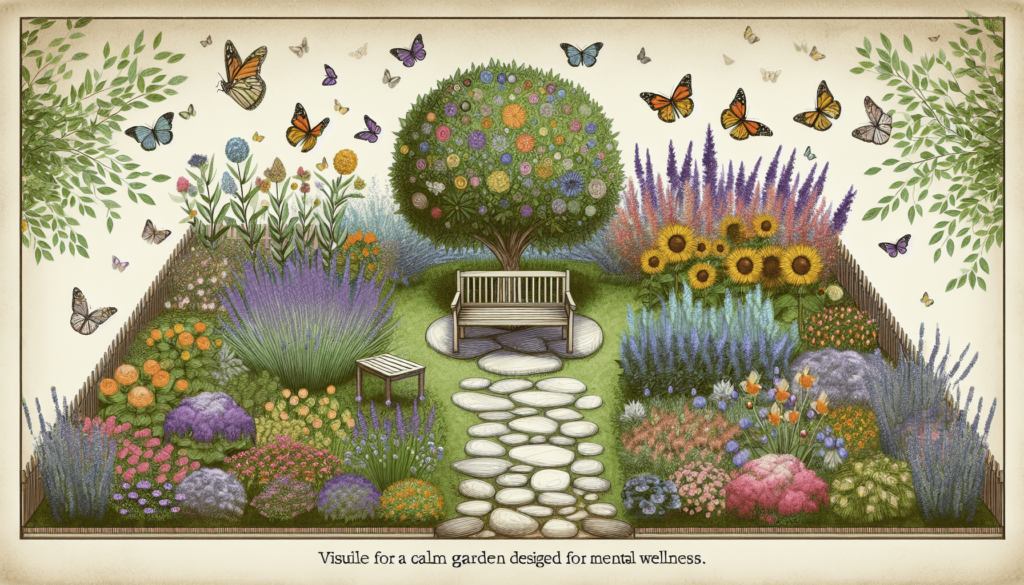Have you ever wondered why spending time in nature can lift your spirits and make the world seem a little brighter? It’s no secret that nature has an incredible ability to refresh our minds and rejuvenate our souls. And the good news is, you don’t have to venture far to benefit from it. By inviting nature into your garden, you can create a personal sanctuary that enhances your mental health.
The Connection Between Nature and Mental Health
Psychologists and researchers have long recognized the positive impact nature has on our mental health. The theory of Biophilia, proposed by biologist E.O. Wilson, suggests that humans have an inherent inclination to affiliate with nature. This connection can manifest in various ways, from our fascination with animals to our enjoyment of natural landscapes.
But how exactly does nature influence our mental health? The benefits are numerous:
Reduction of Stress
Spending time in nature has been shown to lower levels of cortisol, the body’s stress hormone. Nature provides a serene environment that helps reduce anxiety and promotes relaxation.
Enhanced Mood
Natural surroundings can elevate our mood by providing sensory stimulation. The sights, sounds, and smells of a garden can trigger the release of serotonin, often referred to as the “feel-good” hormone.
Improved Focus and Cognitive Function
Exposure to nature has been linked to improved cognitive function and concentration. Time in nature provides a mental reset, helping us refocus and tackle tasks with greater clarity.
Increased Physical Activity
Gardening is a physical activity that also brings mental health benefits. The act of gardening involves varied movements, promoting physical health and, in turn, enhancing mental well-being.
How to Invite Nature Into Your Garden
Now that we understand the extraordinary benefits of nature on mental health, let’s explore how to create a garden that invites nature in. Whether you have a sprawling backyard or a small balcony, there are several ways to introduce natural elements into your space.
Choosing the Right Plants
Selecting plants that attract wildlife is a fundamental step in inviting nature to your garden. Native plants are particularly effective because they provide the necessary resources for local wildlife.
Table: Native Plants and Their Benefits
| Plant Type | Benefits | Zone |
|---|---|---|
| Milkweed | Attracts butterflies, especially monarchs | Zones 3-9 |
| Bee Balm | Attracts bees and hummingbirds | Zones 3-9 |
| Purple Coneflower | Provides seeds for birds and attracts pollinators | Zones 3-9 |
| Goldenrod | Supports a variety of insects and birds | Zones 2-8 |
| Blue Wild Indigo | Nitrogen fixation and attracts bees | Zones 3-9 |
Creating Habitats for Wildlife
Birds, bees, butterflies, and other creatures can transform your garden into a lively haven. Creating habitats for these animals can be as rewarding for you as it is for the wildlife.

Providing Food Sources
Planting fruit-bearing trees and shrubs, as well as flowering plants that produce nectar, will ensure your garden provides a reliable food source for various animals.
Encouraging Shelter
Different wildlife species need places to shelter from the elements and predators. Birdhouses, bat boxes, and dense shrubs offer safe spaces for animals to rest and reproduce.
Water Sources
Adding a water feature like a birdbath, pond, or even a small dish of water can attract a variety of animals. Moving water, in particular, can draw in more wildlife due to the sound and freshness.

Mindful Gardening Practices
Gardening itself can be a meditative activity that significantly boosts mental health. To cultivate a mindful gardening practice, consider these approaches:
Sensory Engagement
Engage all your senses while you garden. Notice the textures of different leaves, the patterns of light and shadow, the fragrance of blooms, and the sounds of rustling leaves or buzzing bees.
Slow Gardening
Take your time and immerse yourself in the experience of gardening rather than rushing through tasks. This slows down your pace and allows you to connect deeper with the natural world.
Seasonal Awareness
Becoming aware of the seasonal rhythms in your garden can foster a sense of connectedness and mindfulness. Observing the changing colors, blooming patterns, and animal behaviors can offer a deeper appreciation of the natural cycle.
Minimal Use of Chemicals
Minimize the use of pesticides and herbicides to maintain a healthy ecosystem. Chemicals can disrupt local wildlife and negatively impact the biodiversity in your garden.
Social Aspects of Gardening
Gardening doesn’t have to be a solitary activity. It can also be a wonderful way to connect with others, which is another important aspect of mental health.
Community Gardens
Participating in community gardens provides an opportunity to meet like-minded individuals, share gardening tips, and work towards a collective goal. Community gardens often have plots available for rent, making it accessible for those without a garden space of their own.
Gardening Clubs
Joining a gardening club can be a great way to socialize with people who share your interests. These clubs often organize events, workshops, and garden tours that can enhance your gardening knowledge and provide social interaction.
Family Bonding
Gardening can be a family affair that brings multiple generations together. It offers a chance to teach children about nature, responsibility, and patience, while also spending quality time together.

Therapeutic Gardening
Horticultural therapy is a practice that uses gardening activities to improve mental and physical health. This form of therapy has been found beneficial for various groups, including the elderly, individuals with mental health issues, and those with physical disabilities.
Benefits for the Elderly
For older adults, gardening can help maintain physical activity levels, improve fine motor skills, and provide a sense of purpose. Raised beds and container gardens can make gardening more accessible.
Mental Health Applications
Horticultural therapy can be particularly effective for individuals dealing with depression, anxiety, and PTSD. The sensory engagement and physical activity provide a natural form of therapy that can be personalized to each individual’s needs.
Adaptations for Accessibility
Gardens can be adapted to meet the needs of individuals with physical limitations. Raised beds, vertical gardens, and ergonomic tools can make gardening more accessible.
Sustainable Gardening Practices
Incorporating sustainable practices in your garden can amplify the mental health benefits by fostering a sense of responsibility and connection to the earth.
Composting
Composting not only reduces household waste but also provides rich soil for your garden. The process of composting connects you to the natural cycle of decay and renewal.
Water Conservation
Using rain barrels and drip irrigation systems can help conserve water and make your garden more sustainable. Mulching is another technique that retains moisture and reduces the need for frequent watering.
Permaculture Principles
Permaculture involves designing agricultural systems that are sustainable and self-sufficient. Applying these principles can create a harmonious environment that is beneficial for both the garden and the gardener.
Pollinator Friendly Practices
Planting a variety of flowers that bloom at different times ensures that pollinators have a consistent food source throughout the growing season. Avoiding pesticides further protects these vital creatures.
Conclusion
The act of inviting nature into your garden provides immense opportunities for improving mental and physical well-being. Whether it’s through selecting the right plants, creating wildlife habitats, engaging in mindful gardening practices, or participating in community gardening, the benefits are profound and manifold.
The steps you take to invite nature into your garden not only create a sanctuary for wildlife but also carve out a personal haven for yourself. The joy, peace, and fulfillment that come from tending to a garden can be transformative, making it a purposeful endeavor that rewards the heart, mind, and soul.

My name is Michelle Warren, and I’m the founder of Peaceful Gardening. As a 10-year breast cancer survivor, I’ve discovered the profound therapeutic power of gardening. This journey has not only helped me recover but has also become my passion and a source of ongoing peace and joy.
Peaceful Gardening was born from my desire to share the healing benefits of gardening with others. Whether you’re facing health challenges, dealing with stress, or simply looking to connect more deeply with nature, this space is for you.
Over the past decade, I’ve cultivated not just plants, but a deep understanding of how gardening can positively impact mental health. I’ve worked with local community gardens, led workshops on mindful gardening practices, and collaborated with mental health professionals to develop gardening-based stress reduction programs.
Peaceful Gardening was born from my desire to share the healing benefits of gardening with others. Whether you’re facing health challenges, dealing with stress, or simply looking to connect more deeply with nature, this space is for you.
Here, you’ll find evidence-based advice on using gardening as a tool for mindfulness, stress relief, and emotional healing. I share personal stories, practical tips, and scientifically-backed information on how to create your own therapeutic garden space, no matter the size of your yard or balcony.
My mission is to help you discover the joy, peace, and healing that comes from nurturing plants and connecting with nature. Join me in exploring how the simple act of tending to a garden can transform your mental and emotional wellbeing.
Welcome to Peaceful Gardening – let’s grow together towards better mental health!”
